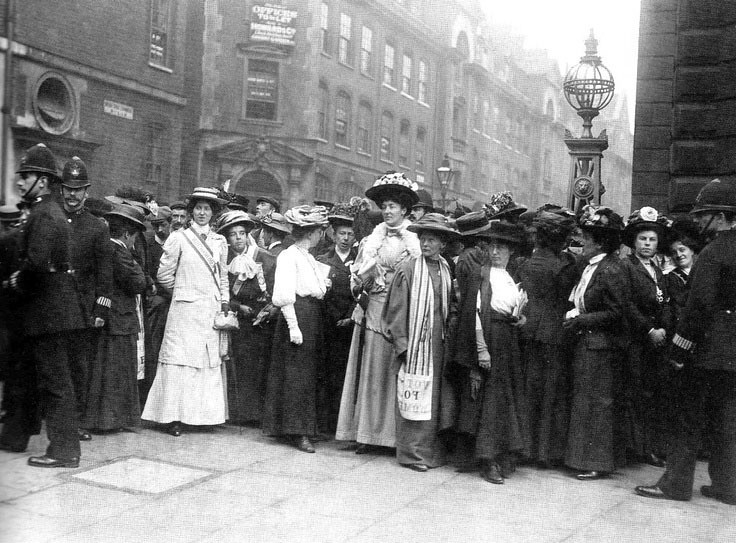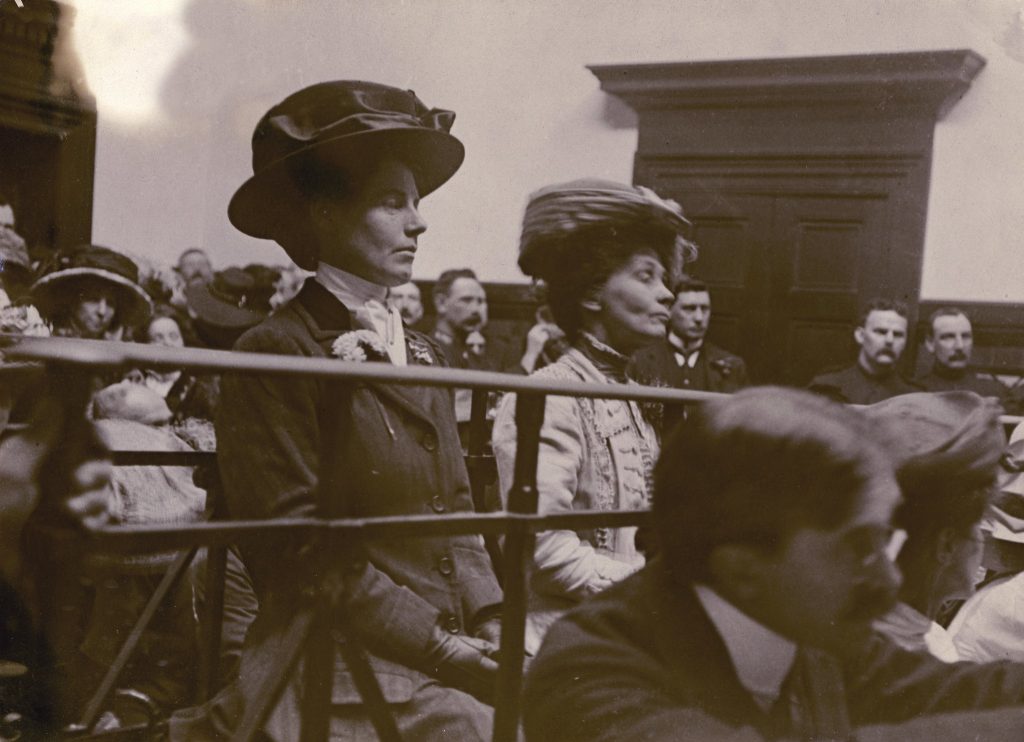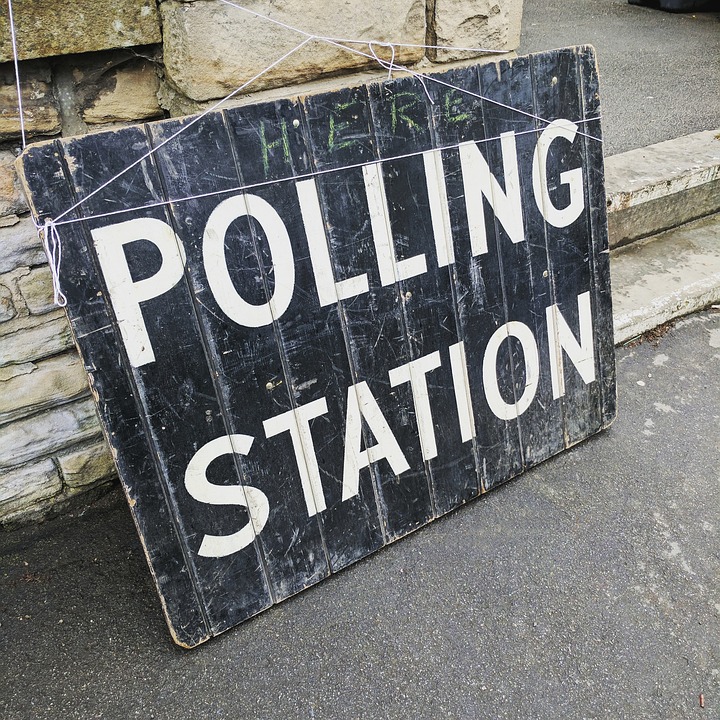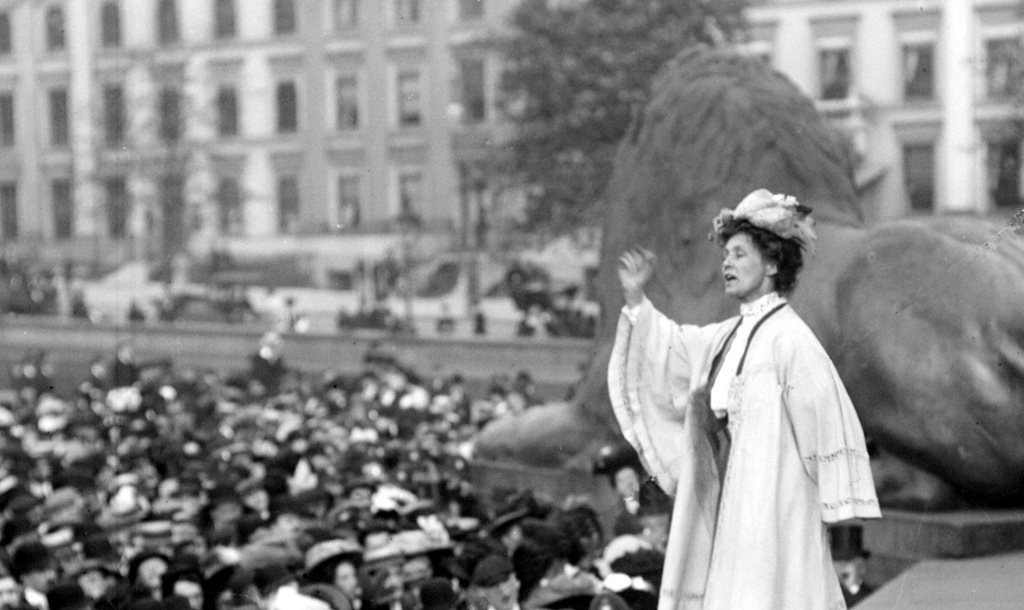Emmeline Pankhurst fought militantly to secure women’s voting rights in the early twentieth century and founded the Suffragette movement. RightsInfo takes a deeper look at her life and achievements.
Who was Emmeline Pankhurst?

Emmeline Pankhurst, Christabel Pankhurst and Flora Drummond went on trial at Bow Street Magistrates Court before Mr. Curtis Bennett. Image Credit: Leonard Bentley / Flickr.
Emmeline Goulden was born on 15 July 1858 into a political family. In 1879, she became Emmeline Pankhurst when she married Richard Pankhurst, a lawyer and supporter of the women’s suffrage movement (the movement to gain votes for women).
She had five children, including three daughters, but that didn’t stop her political activities. Pankhurst was imprisoned many times, went on hunger strikes and was force fed.
When World War I started, Pankhurst used her political expertise to support the war effort. Pankhurst died only weeks before achieving her ambition of equal voting rights with men.
‘Deeds Not Words’: What Role Did Pankhurst Play In The Suffragette Movement?

Image Credit: LSE Library / Flickr.
Pankhurst founded two women’s suffrage organisations, the Women’s Franchise League, which fought to allow married women to vote in local elections and more notably the Women’s Social and Political Union (WSPU) or ‘the Suffragettes’, as the Daily Mail christened them.
The Suffragettes fought militantly for the right for women to vote and adopted the motto ‘deeds not words’. Pankhurst didn’t think that speeches about women’s suffrage achieved anything, so the Suffragettes focused on direct action.
The Suffragettes organised demonstrations, window smashing, arson and hunger strikes when sent to prison. They engaged in violence, broke laws and damaged property. Two Suffragettes threw rocks at the Prime Minister’s home and another wrote a passage from the Bill of Rights on the House of Commons wall. Suffragettes detonated bombs, and threw an axe at the Lord Mayor and Prime Minister’s carriage.
The first of Pankhurst’s seven arrests was in 1908, when she tried to enter Parliament to deliver a protest to the Prime Minister. During her trial she argued: “We are here not because we are law-breakers; we are here in our efforts to become law-makers.”
Nevertheless, the court sent her to prison for six weeks for obstruction.
Although the Suffragettes had suspended militant activities, the outbreak of war actually helped the Suffragettes’ cause. Women did jobs typically done by men and did them just as well. The vote was extended because of this, a trend towards increased suffrage for men too and an imminent election.
The Representation of the People Act 1918 allowed women over 30 who met a property qualification to vote. Finally, the Equal Franchise Act 1928 enabled women over 21 to vote. They had won the same voting rights as men.
The Perception Of The Suffragettes
Political parties weren’t happy with the Suffragettes and men who believed they had lost the election due to Pankhurst’s activities attacked her. Other opponents argued that the Suffragettes’ activities showed that they were emotional and illogical.
A moderate women’s suffrage movement, the National Union of Women’s Suffrage Societies (NUWSS), led by Millicent Fawcett, had originally praised the Suffragettes’ courage and dedication, but later derided the hunger strikes as publicity stunts and argued that the militants represented the chief obstacle in getting what they wanted.
Some journalists noted women responded to Pankhurst’s speeches, but others condemned her approach. The Daily Mail’s first use of the term ‘Suffragettes’ was intended as a mockery. But the women embraced the term saying ‘suffraGETtes’ implied that they intended to get the vote.
Historians argue that, although the first stage of the Suffragettes’ activities had a mobilising effect, their later use of militancy harmed their cause. There’s also debate about whether the Suffragettes were terrorists.
Whatever the perception at the time and at the moment, it’s great to see that more women voted in the 2017 general election than men, according to a YouGov survey poll.
The Right To Vote Today

Image: Pixabay.
Since 1969, all men and women over 18 can vote. The Representation of the People Act 1983 now provides our voting rights under domestic law. Although there are still some restrictions, most notably that prisoners aren’t allowed to vote.
There’s also Article 3 of the Human Rights Convention, which requires free elections at reasonable intervals by secret ballot. It also states that there have to be conditions to ensure free expression of the opinion of people in choosing their legislature. This right also implies the right of everyone to vote and stand as candidates.
Most human rights instruments also include a provision about the right to vote and to participate in free elections.
Read more:
- The Suffragettes
- The right to vote
- Women’s rights







